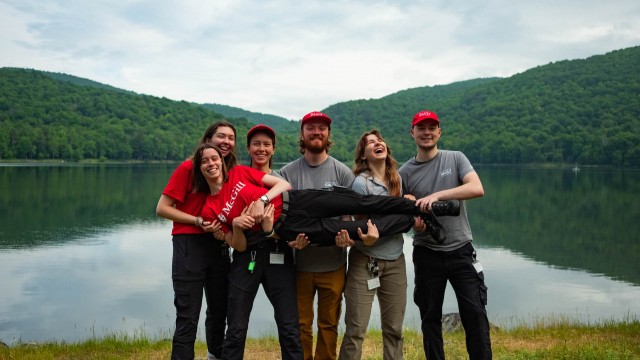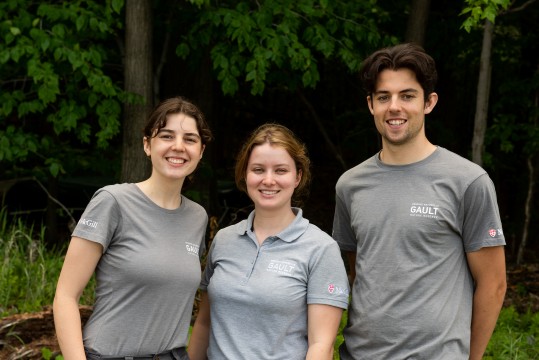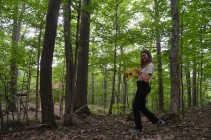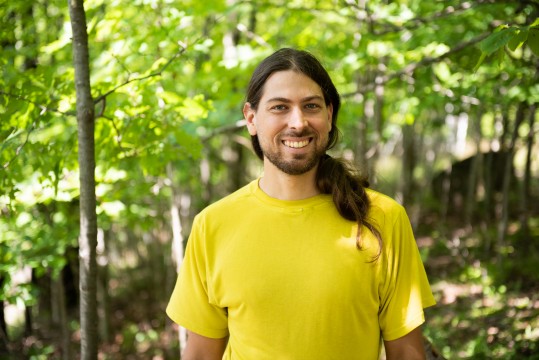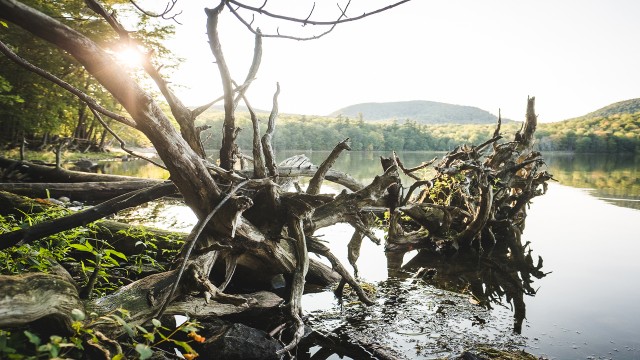The summer work experience at the Gault Nature Reserve is an opportunity for McGill students to obtain hands-on experience at a nature reserve and field station. Over the course of the summer, the interns develop sought-after skills for careers in biological and environmental sectors. This year, their work comprised of research, science communication, public outreach, fieldwork, and much more.
As the days become shorter and the leaves slowly begin to change colour, we're reminded that the 2023 field season is coming to an end. Over the last few months, the interns have assisted in the operations required to run Gault. All the interns agree that this experience was rewarding, educational, and lots of fun. Let them share with you the highlights of their summer at Gault.
Night mission at Gault House
This summer, the interns had the opportunity to assist in many ongoing projects. Greg, a recent McGill graduate, told us that their favourite project was surveying a bat colony that lives in the attic of the historical Gault House on Lac Hertel. A colony of little brown bats has established a nursery in the building where they give birth and raise their young, and the Gault Nature Reserve is keeping track of the population because this species of bat is currently endangered. Counting the bats as they emerge from their roost is time-consuming, but this method is a good measure of population growth.
"It was so inspiring to see their numbers double as their babies reached maturity," said Greg. "I think what I appreciated so much was this sort of contradiction: it was arduous, but the data was important." they added. "It was nice to spend time with my friends/roommates/coworkers."
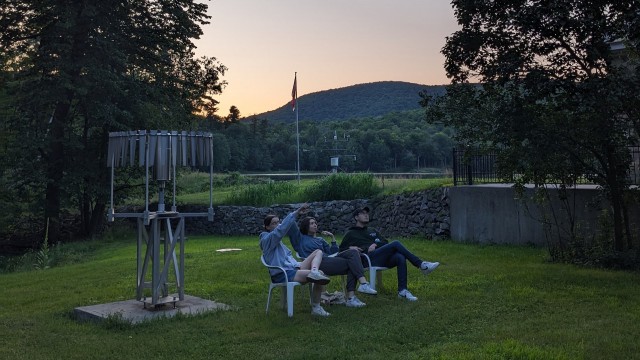
Morgane, Niamh, and Philippe count bats as they leave the Gault House attic (photo: Seonaid Newell-Macintosh)
Contributing to the future
Many projects, like the Bat Survey, must occur over several years. For this reason, the interns will continue the work from this summer next year. Olivia, an Environmental Biology student at McGill, expressed that she was most excited to pass down the Herbarium project to next year's interns.
"The Gault Herbarium is a collection of dried plants stored to create a historical archive of the Reserve's flora dating back to the 1940s," she explained. "Organizing and digitizing it is a fun project for rainy days and allows the Reserve to eventually contribute to worldwide plant databases."

Olivia organizes Gault's Herbarium to prepare for the digitalization process (photo: Morgane Dubé)
Greg expressed that they were looking forward to the continuation of Gault's seed bank project.
"Preserving the genetic diversity here at Gault is such an important task," said Greg. "Now that we have laid the groundwork, I am so excited to come back to the Reserve one day and see native plants that were propagated and raised right here.
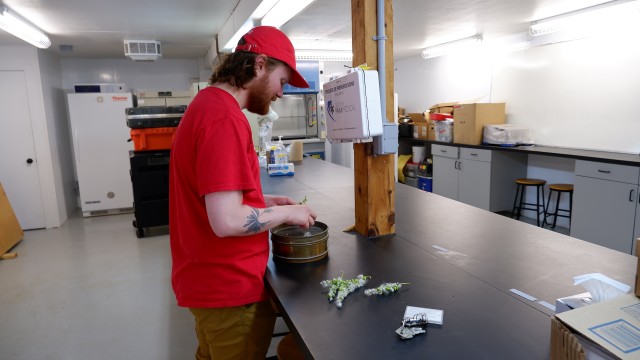
Greg uses a sieve to separate seeds and chaff (photo: Morgane Dubé)
An important battle
The team accomplished a lot in the little time they had. Niamh, a recent McGill graduate, told us that she thought the interns' most significant accomplishment was identifying and removing invasive plants found on the mountain. Unfortunately, invasive non-native plant species have been introduced to the Gault Nature Reserve over time, damaging the rest of the ecosystem. This summer, the team was tasked with identifying patches of invasive plants and removing them to control their spread.
"Although this assignment was labour-intensive, I think this was one of the team's greatest accomplishments because of the positive impact it will have on the other plants affected by these invasions," said Niamh. "We removed a total of 462 kg (about 1018 lbs.) of invasive plants—which we believe will significantly reduce the spread of invasive species in the years to come."
However, the job is far from over; most invasive plants require many back-to-back years of intervention to be fully eradicated. Subsequent interns will carry out this critical and fulfilling mission in the years to come.
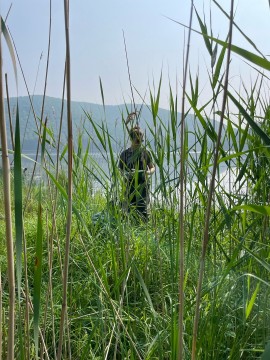
Niamh (pictured) and the other interns removed invasive Phragmites surrounding Lac Hertel (photo: Olivia Grossi)
Raising awareness to protect ecosystems
Sadly, non-native plant invasions are not the only concern at the Gault Nature Reserve. Seonaid, a second-year Environment student, expressed their concern about the white-tailed deer overpopulation.
"Deer are majestic creatures, beautiful and worthy of respect and protection like any other, but their population numbers are currently out of equilibrium with the rest of the mountain," said Seonaid. "For the past 20 years, they've had a massively detrimental impact on the ground story of the forest as they've increased in number, reducing the biodiversity of our flowers and ground plants and overusing resources that they usually share with rodents, insects, and birds."
To help spread awareness, the interns have been presenting this issue to the public.
"It feels good and proactive to present an educational kiosk on the importance of the understory every week," Seonaid said. "I hope the Reserve can find a way to solve this issue together with scientists and locals."
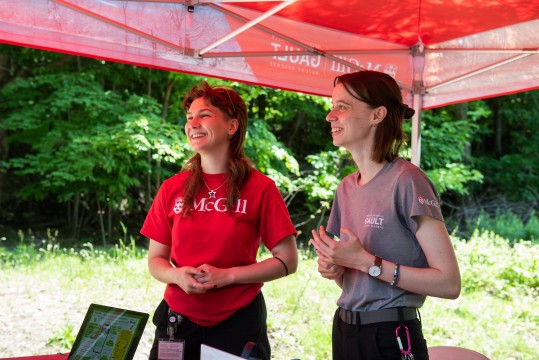
The interns held weekly educational kiosks to help inform the public about the white-tailed deer overpopulation. (Left: Olivia and Right: Morgane) (photo: Alex Tran)
An opportunity to grow
In addition to working on team projects, the interns had many opportunities to learn about new topics and get to know themselves. Philippe, who studies Sustainability, Science, and Society, lives near the Reserve and was already familiar with some of the trails before he started the internship. However, he was less aware of the daily operations of the Reserve.
"Working here has given me a great overview of what happens daily in a nature reserve and provided me with hands-on experience that translates into valuable life skills," said Philippe. "This internship offers a good balance between office work and physical fieldwork, which is helpful if you are not sure what you want to do as a job later because it allows you to see what you prefer."
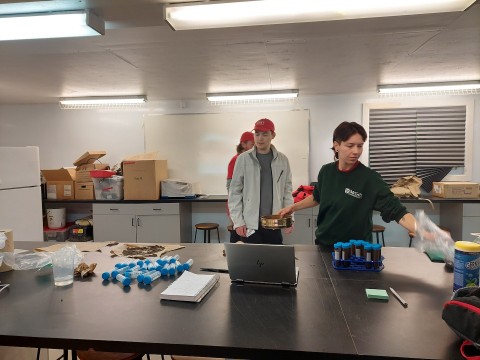
Philippe (left) and Seonaid (right) conduct a soil chemistry analysis for a revegetation project (photo: Savannah Bissegger O'Connor)
An exclusive access to the mountain's wonders
Throughout the summer, the interns had the choice to live in a chalet at Gault or commute from home. Morgane, a second-year biology student who also lives near Mont St-Hilaire, decided to stay home for the summer and drive to work every day.
"The daily commute to the mountain turned out to be quite pleasant," said Morgane. "Spending more time with my parents in Saint-Hyacinthe was very special since I'm usually away during the semester. This balance between work and family became a prized aspect of my internship experience."
On the other hand, interns who lived further from Mont St-Hilaire decided to stay on the Reserve. Niamh had the best of both worlds because she lived on the Reserve during the work week and returned home to Montreal on the weekends.
"I really enjoyed living on-site with three other interns because this allowed us to get to know one another outside of work," she said. "After we finished working for the day, we liked to cook dinner together and occasionally explored the small towns close to the mountain."
Living on-site also gave her the unique opportunity to observe the Reserve outside of visiting hours. During the quieter evenings, the interns witnessed the wildlife emerge from the forest without fear of encountering humans. "This was a very special experience, and I count myself lucky to have the opportunity to see Gault's wildlife up close in this way," said Niamh. Once the work week ended, she would return to Montreal to enjoy time off and see friends and family on the weekends.
The summer in one word
Lastly, we asked the interns to describe their internship experience in one word. Here are their answers:
Seonaid: "Hopeful. After learning so much environmental theory, it's inspiring to be one of many people on the ground working actively to preserve and protect our environment."
Niamh: "Productive. Our tasks were different daily, and we accomplished so much in so little time. It's been incredibly rewarding to be a part of this team and see our work's impact."
Olivia: "Experience. I came into this internship with little knowledge of or time spent outdoors, and now I feel properly equipped for any field work jobs I may have in the future."
Philippe: "Opportunities. Our different projects allowed us to explore the many sides of conservation work, whether that means repairing data collection devices in the field, cutting invasive plants in waders, writing science outreach articles, creating kiosks, or helping researchers in their work."
Morgane: "Engaging. Throughout the summer, I was able to be part of projects related to my interests, which made me enthusiastic and dedicated to working here."
Greg: "Fun. I could talk about the diversity of opportunities, the transferable skills, and the hands-on experience I gained here- which is great, valuable, and completely accurate. But for me, the internship was, above all, fun. I had the best coworkers. I got to play in the mud. I got to spend whole workdays on the lake and in the woods. I got to write about my nerdy interests and share my enthusiasm for science with the world. I got paid to do what I love. It was just so much fun!"
Niamh Stafford
Field Operations Assistant
Gault Nature Reserve of McGill University
Header: The six interns pictured above are all current or graduated McGill University students pursuing bachelor's degrees in Biological and Environmental sciences (photo: Alex Tran)
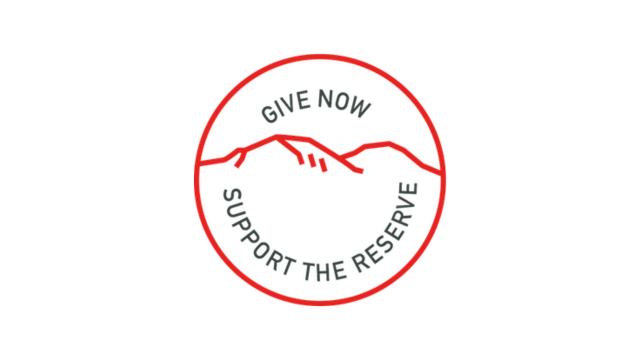
Feeling inspired by the interns' stories? Help create experiences that change students' lives by supporting the Gault Nature Reserve.
